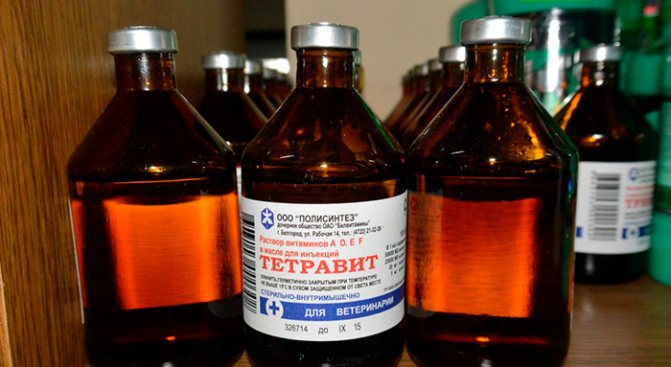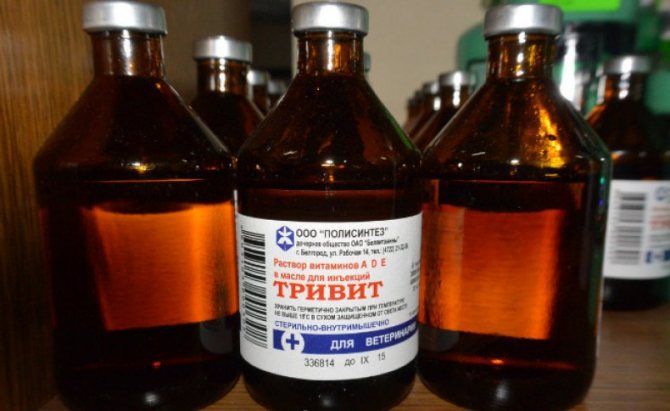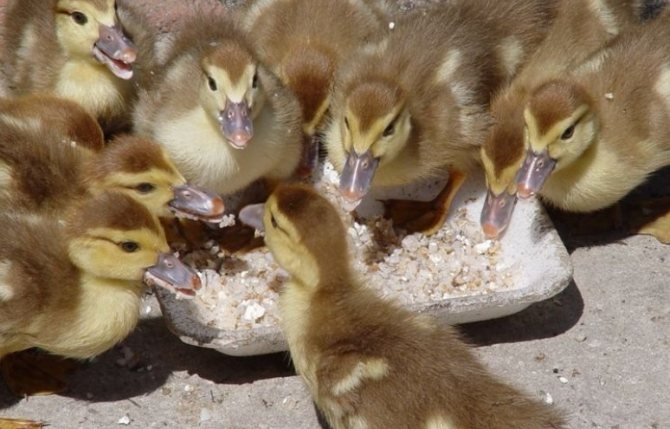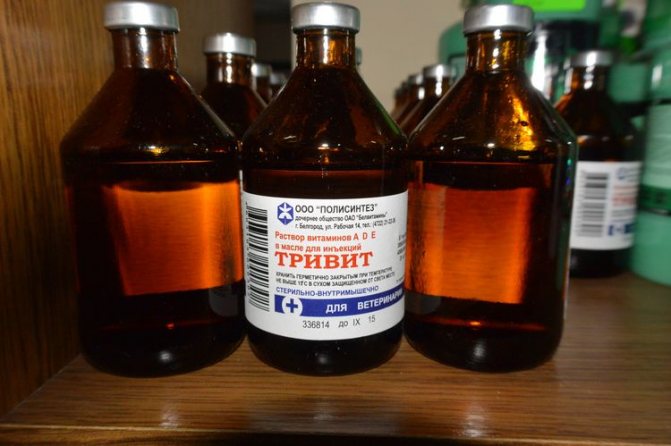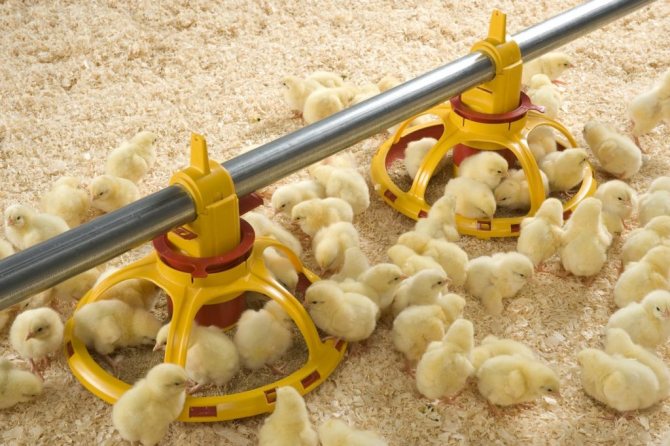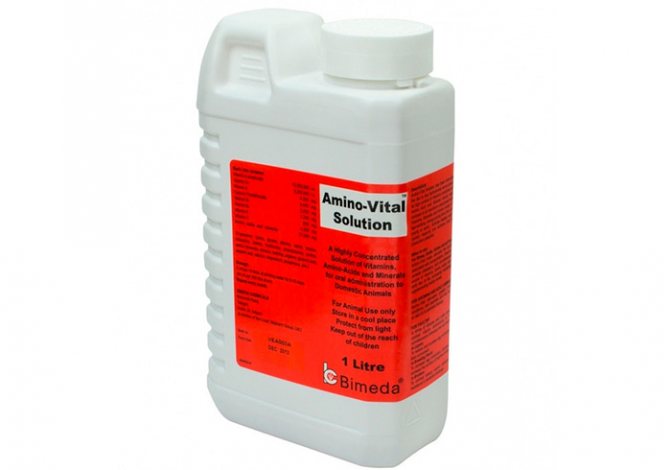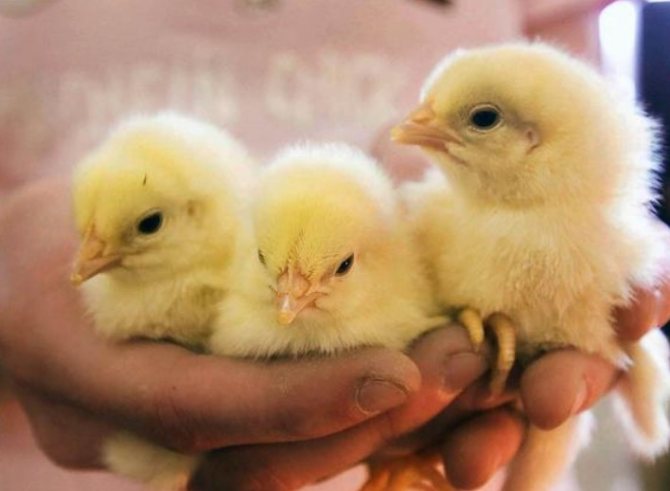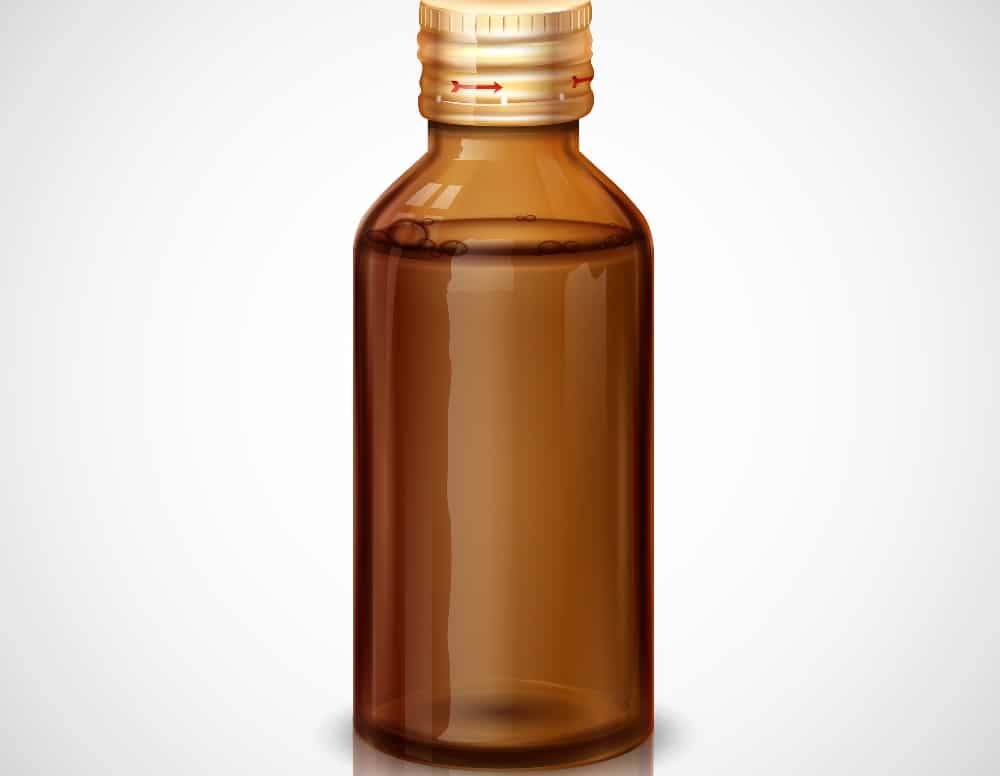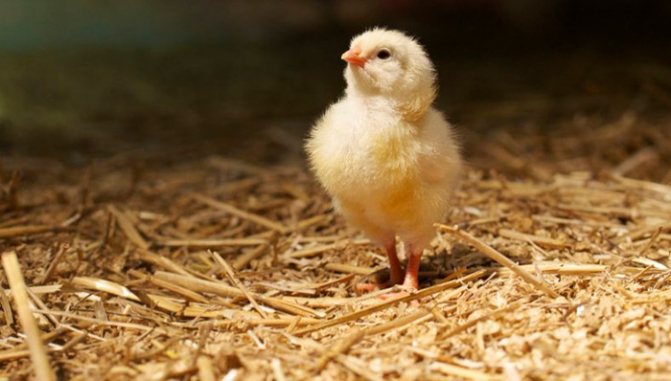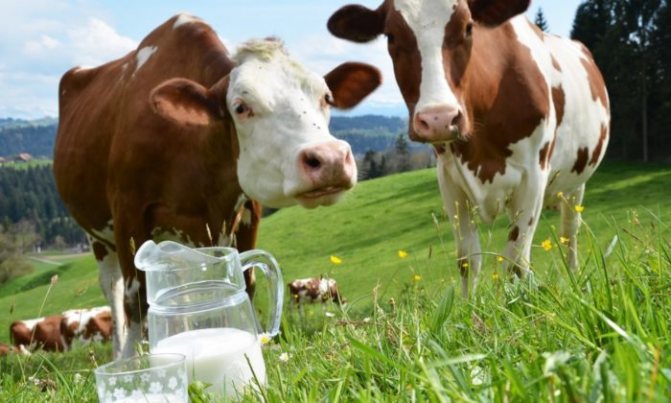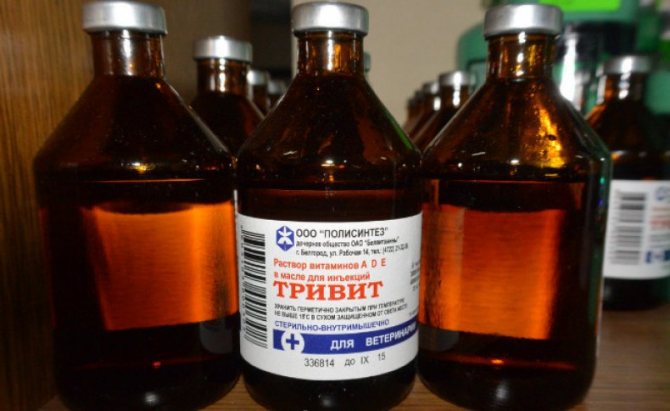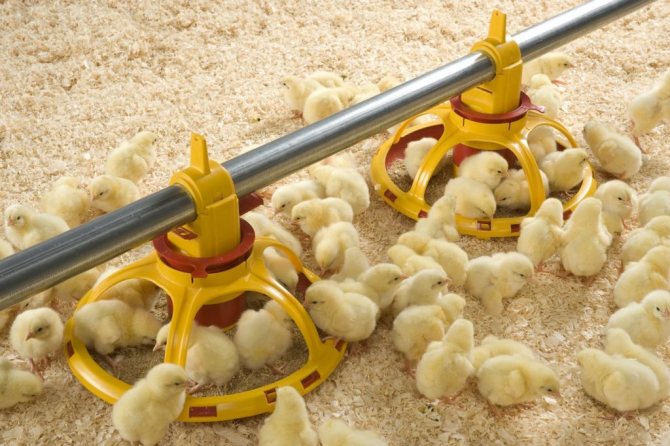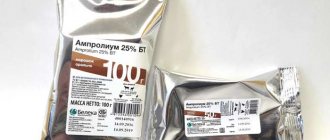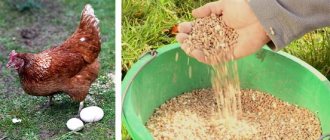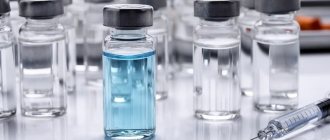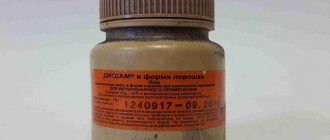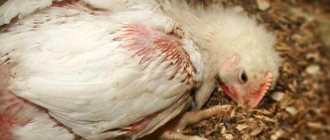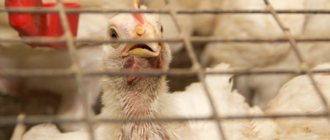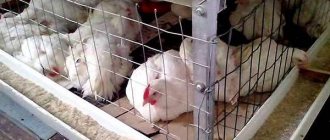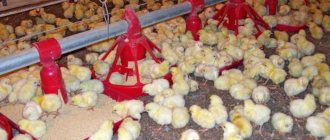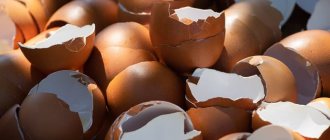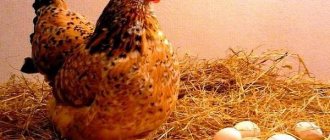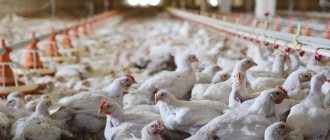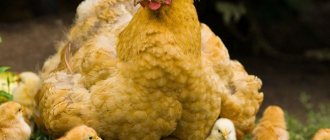Bird breeding requires a lot of time and effort. It is not enough to choose the necessary food for them and provide an appropriate daily regimen, you also need to choose the right vitamins for broiler chickens. Their presence in the diet is considered necessary, because they ensure the full flow of vital processes. Their deficiency can lead to stunting, weakening of the immune system. However, when going to a veterinary pharmacy, it is worth knowing which vitamins are best for day-old broilers. It is important to find the right medication and the correct dosage, otherwise adverse effects may occur.
How to give trivitamin to poultry?
This drug contains vitamins A, D and E. It is they who optimize all the basic functions in the body. The main purpose of trivitamin is the prevention and treatment of vitamin deficiency (hypovitaminosis).
This disease can develop in poultry if the amount of vitamins consumed by the body significantly exceeds the proportion of incoming ones.
If the body lacks vitamin A, then it is easier for chickens to pick up infectious diseases. In addition, deterioration of the functioning of tissues, mucous membranes is called as symptoms.
How is vitamin A deficiency manifested in poultry? There are several main external signs by which hypovitaminosis is recognized. Among them:
- drop in vision;
- digestive disorders;
- the presence of conjunctivitis;
- weakness and fragility of the limbs;
- deterioration in reproduction (including a decrease in the number and quality of eggs laid);
- loss of feathers;
- unhealthy appearance of claws (fragility, curvature);
- disturbed respiratory processes.
If chickens do not have enough vitamin D, then the body needs calcium. This element is necessary to maintain healthy claws, feathers, and bones.
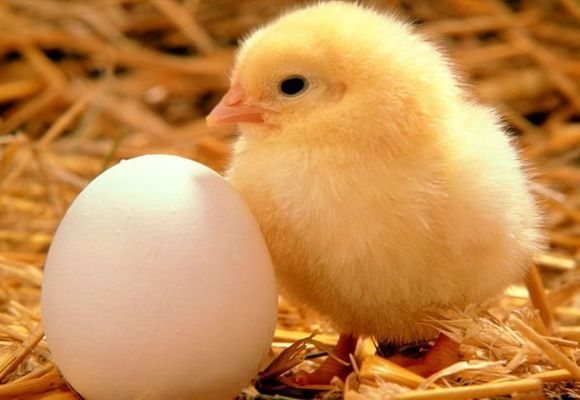
Calcium is absorbed correctly when the body has enough vitamin D. Note that this is important for young birds, since their bones are just beginning to form and grow stronger.
The use of trivitamin is necessary when the hen lays very few eggs, its growth and development lag behind other individuals. Other symptoms include fragility, brittle bones, beak deformation, and problems with movement.
For normal growth and development of poultry, vitamin E is needed. If it is not enough in the body of pets, then the chicken begins to lay few eggs, the number of chickens hatched decreases, its nervous and muscular systems fail.
That is, if the level of egg production has decreased, and the embryos are not developed as needed, then the chicken urgently needs to start giving vitamin supplements. For the offspring of a bird to be complete and healthy, vitamin E is needed. Its main action is aimed at ensuring that future chicks develop correctly.
Especially the lack of vitamins is manifested in birds that are bred in closed poultry farms, since there is no way to take them out into the fresh air and give them natural food. Therefore, for such individuals, vitamin complexes are especially needed, which contribute to the full development of birds.
Pharmacology
Retinol is a growth vitamin. It stimulates the development of the individual, provides the protective properties of the skin, and accelerates its healing. Forms visual perception, normalizes the metabolism of lipids and minerals.
Cholecalciferol is responsible for bone calcification.Vitamin D deficiency causes rickets in young animals. And in adult animals - osteoporosis or osteomalacia.
Tocopherol has an antioxidant effect and is involved in the reproduction process. It is called the multiplication vitamin. Lack of tocopherol is manifested by disturbances in the formation of muscular and nervous tissues, perversions of lipid and carbohydrate metabolism. A deficiency in one of the above vitamins increases the need for others.
Trivitamin release and doses
The release of trivitamin is carried out in the following main forms:
- Taking medicine by mouth (10, 100 and 1000 ml).
- Solution for injection (100 ml).
If trivitamin is needed by a poultry farmer with a large farm, then you can purchase the drug in a canister, the maximum volume of which is 34 liters.
Instructions for use for birds are attached to trivitamin. Thanks to her, you can familiarize yourself with the composition, dosages and methods of using the drug.
What does trivitamin P look like for chickens? It is a liquid that resembles oil in consistency. It has a yellowish tinge and a smell reminiscent of vegetable oil. During the manufacture of the vitamin complex, no harmful substances and chemical compounds are used that could harm the health of the bird (GMO, carcinogens, etc.).
Alternatively, trivitamin is called trivit and tetravit. All of them have the same effect on the bird's body, however, their difference lies in the proportion of vitamins. If trivitamin is purchased in the form of an injection solution, it can also be given to the bird by mouth.
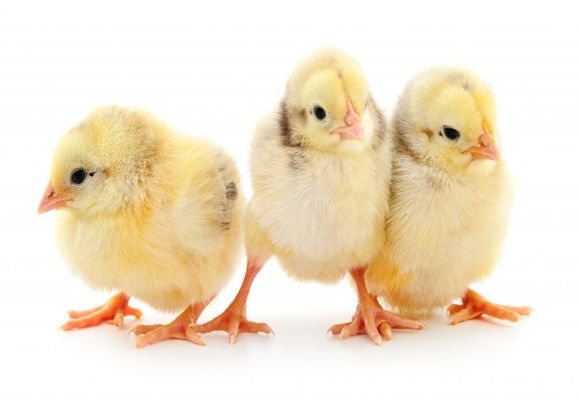

It should be remembered that if you mix such a trivitamin with water, and not with food, you can provoke an overdose of the drug. This is possible, since the saturation of the bird's body occurs in different ways.
You need to be especially careful when using products that contain vitamin D3. Each such drug must be accompanied by an instruction, which describes in detail how best to use the drug. If an overdose is allowed, then the pets can be seriously injured.
Control over vitamins in broiler diets
Chickens will not get sick with vitamin deficiency if you monitor the quality of feed and provide them with vitamin supplements in a timely manner. You can cope with a mild form of this disease on your own if you introduce vegetables, herbs, fruits, bone meal, sprouted grains, and cottage cheese into the diet of birds.
It must be remembered that vegetables and herbs alone are not enough to fully provide the bird with all the necessary vitamin supplements. Vitamins are found in a wide variety of foods. For example, B can be found in baker's yeast. Shock dose C - in sprouted grain. Milled grains of wheat, corn, oats contain A, B, E, PP. Boiled yolk contains a lot of vitamin E.
All these products must be in the diet of chicks. True, they must be introduced gradually so that the stomach of the birds gets used to the new food.
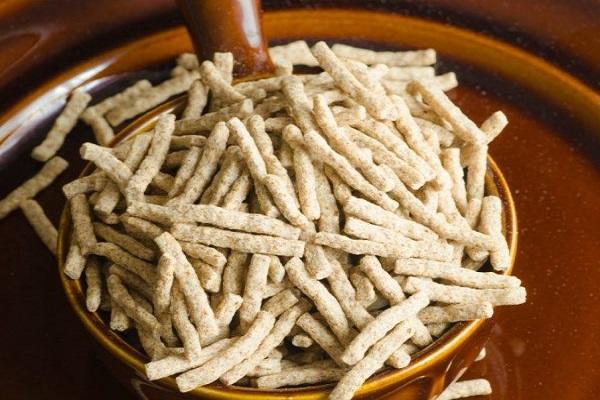

Chicken trivitamin
If you give this drug to a small chicken, you can protect it from rickets, lameness, diseases of the joints and legs. These diseases are very dangerous, so it is better to prevent them than to treat them later.
The use of trivitamin for prophylactic purposes is allowed for those chickens that are 5-7 days old. The procedure is carried out within a month. One drop of trivitamin is designed for 2-3 individuals. The medicine is given once a week. In special cases, the drug is placed in the beak of each bird separately.
What is the dosage for small chickens? Experienced poultry farmers advise to water a chicken that is 1 or more weeks old, in the proportion of 515 ml of the preparation per 10 kg of feed mixture.
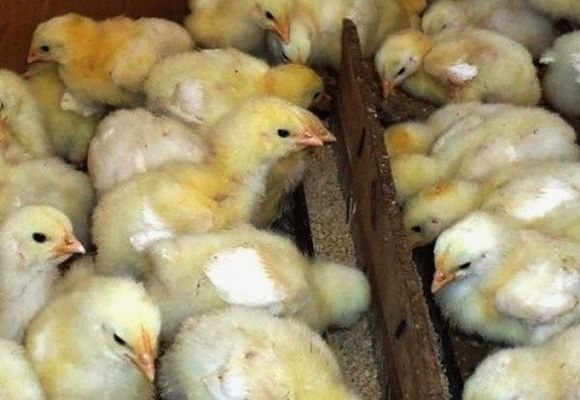

If the individual is treated according to an individual program, then 2 drops of the solution are used for chickens of meat and egg lines, which are more than 9 weeks old. Broilers who cross the 5-week threshold are advised to give 3 drops of the medication.If you use trivitamin every day for a month, you can save the bird from diseases.
Injections for pigs and piglets with Tetravit medicinal solution
Adult pigs are vitamin deficient during the winter and spring seasons. This is due to their insufficient content in the feed prepared for the winter, with the long-term use of boiled vegetables and cereals, with the use of concentrate mixtures. Diseases associated with metabolic disorders begin. The pig's skin changes color, spots and ulcers appear on it, bristles easily fall out, intestinal infections develop
.
Already at the beginning of the symptoms noticed, treatment with the drug Tetravit is started. It is added to pig feed, which is enriched with fresh chopped root crops, silage. Piglets are more susceptible than others to diseases associated with a lack of vitamins. Insufficient content of them in the sow affects the milk that the piglets eat.
For the treatment of vitamin deficiency in piglets, tetravite is injected into the nape area: the recommended dose is 0.1–0.2 g. Injections should be carried out once a day, for 15 days
.
The instruction of the drug Tetravit for animals contains a number of features that you should pay attention to
- Sometimes at the injection sites, a mild rash and irritation appears.
- Contraindicated for use in case of increased sensitivity of the animal's body to any vitamin.
- Do not use Tetravit for animals with liver and gastrointestinal tract diseases recorded in them.
- For pregnant individuals, the drug should be prescribed by a veterinarian.
- Together with the intake of vitamin medication, it is recommended to give food enriched with other microelements.
- The use of laxatives, along with Tetravit, weakens the effect of its use.
- Other vitamin complexes should be taken after the end of the course of treatment with Tetravit.
After taking Tetravit, animal meat can be consumed for cooking without fear. Store the medicinal product need in a dark, cool place
... Vitamins lose their healing properties when exposed to bright light. Shelf life is two years.
I used tetravit on the advice of friends. Reviews on the Internet about the drug are the most positive. After the winter, my dog began to shed very much. I do not know how to give injections and am afraid, so I began to add tetravit to the feed. Improvement came after two weeks of treatment. I don't know if tetravit or diet helped.
Olga. Krasnogorsk
Tetravit is a good vitamin preparation. The viscous mixture of the solution is difficult to draw into a syringe and inject it under the cat's skin. The drug began to drip directly into the mouth. After a week of use, the cat's appetite improved, the coat became smooth and shiny. For the injections, I will probably pick up some other vitamin complex.
Tatyana. Moscow
In early spring, the cat's fur began to look bad, tangles appeared. Then there were problems with food. The pet store advised me to buy Tetravit, as the best drug for the treatment of vitamin deficiency. Accepted according to the instructions. Improvements in my cat's well-being came pretty quickly. Now I plan to give her Tetravit for prophylaxis all year round.
Anastasia. Moscow region
We all sometimes feel lonely or unspent love. Someone has another child, but for someone it is a very responsible step, and they fill a piece of heart with the fact that they have pets. But they need good attitude and care no less than small children, so you should not be negligent towards them. Unfortunately, they, like people, sometimes get sick, and in order to maintain their immunity, it is sometimes necessary to give your pets vitamins. Do not be stingy, because they also want warmth and care.
Trivitamin for goslings
If the goose or duckling is from 1 to 8 weeks old, then it is advised to give trivitamin in the following proportion: 7.3 ml per 10 kg of feed mixture.Treatment is carried out once every 7 days. Individuals who rarely appear in the fresh air and practically do not eat fresh herbs are susceptible to vitamin deficiency.
When a lack of vitamins is detected in a particular bird, the drug is instilled into its beak for a month. Measures for the prevention and treatment of vitamin deficiency are discontinued if all the symptoms of the disease have passed. Young goslings are instilled in 5 drops for one individual.
What are the advantages of premixes?
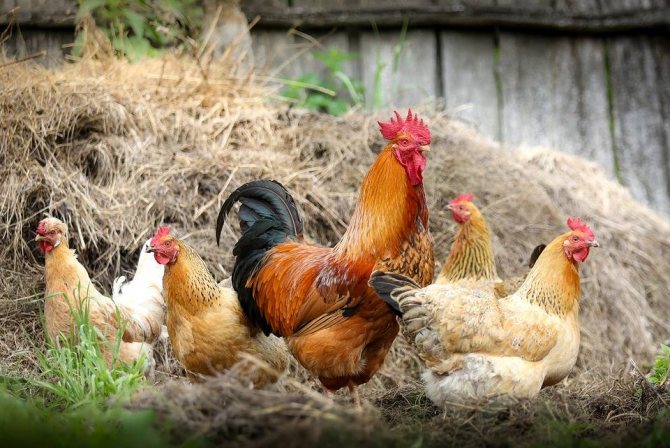

1. Improves egg production up to 300 eggs / year 2. Increase the immunity of the bird 3. Improve egg fertility and hatchability 4. Promote plumage 5. Strengthen the eggshell and increase the nutritional value of eggs 6. Reduce feed costs 7. Prevent beriberi 8. Provide complete feeding
Trivit for turkey poults
This breed of birds, like many others, needs vitamins. If turkey poults are grown on an industrial scale, then vitamin deficiency can occur quite often.
This is due to the fact that on farms and poultry farms, poultry, as a rule, do not walk and do not have the opportunity to eat fresh grass.
The dosage used for turkey poults depends on the total number of pets on the farm.
If the age of the chicks varies from 1 to 8 weeks, it is recommended to give 14.6 ml of trivit per 10 kg of feed mixture. The medicine is used once a week for prophylaxis, and as a treatment it is necessary to give 8 drops throughout the month.
Natural Vitamin Supplements
From the first minutes of life, chicks must be properly fed so that they grow healthy and gain weight quickly. After birth, they can be given a fat-free serum. 3 days after birth, the chicks, in addition to millet and compound feed, are given yolk, cottage cheese, yogurt, fresh grass, cereal sprouts. On the 5th day, add grated carrots, cabbage, sorrel, green onion feathers.
See also
Is it possible and how to properly give salt to chickens, when it is impossible to add to the dietRead
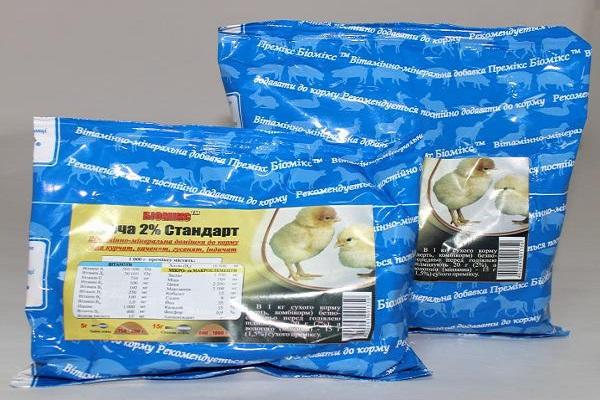

Vegetables are given in the calculation of 1 gram per bird, over time the dosage is increased to 5 grams. On the 8th day, brewer's yeast is added to the feed every 2 weeks (1 spoon for 10 birds).
On the 6th day, chickens can be given vitamin pharmacy complexes in the dosage specified in the instructions. Additives are mixed into moistened feed or poured into drinking water. It is allowed to use premixes consisting of a complex of vitamins, various minerals, amino acids and antibiotics. Such an additive in small doses is added to the feed, however, the food should not be hot, otherwise useful substances will be destroyed. Ready-made premixes are contained in the starting compound feed.
For other species of birds
Trivitamin is suitable for the prevention and treatment of various types of poultry. Among them are quail, duck, guinea fowl, etc. In order to give the drug in the correct dosage, you should carefully read the instructions for it and strictly follow it. It should be noted that the dosage may vary depending on the type of bird.
To give the bird trivitamin, it is mixed with dry or wet 5% feed before feeding. After the vitamin complex is added to food, it cannot be heated and stored for more than 1 day.
The thing is that vitamins disappear during this time, as a result, the drug loses its therapeutic effect.
Storage
Trivit does not tolerate freezing, overheating and bright lighting. Preservation at 5-25 degrees ensures the suitability of the medication for 2 years. The instructions do not indicate the terms of use of the opened containers. It should be borne in mind that for other medications it is recommended to use the parenteral drug in 4 weeks. Oral product oxidizes if the container is left open.
Trivit belongs to the traditional drugs that have been tested for decades. Technological progress has provided livestock breeders with a wide range of vitaminizing agents.Trivit is inferior to them in productive action, but the ease of use, the absence of contraindications, low cost, habit leave the drug in demand.
Vitamins are essential for the normal development of animals and birds, including broiler chickens. There is a large selection of such products on the shelves of veterinary pharmacies and in specialized stores. One of these drugs is Trivit. With its help, animals and birds can be kept in optimal condition. This name was given to the remedy for its three main vitamins: A, E and D3.
How to use trivitamin for adults?
If an adult bird has been found to have vitamin deficiency, it can also be drunk with trivitamin. Treatment will be carried out as follows: 1 drop per day for each bird.
When the drug is not given individually, but for all individuals, a special dosage is used: 7 ml per 10 kg of feed is given to chickens and turkeys, 10 ml per 10 kg is recommended to be given to ducks, 8 ml per 10 kg - to geese.
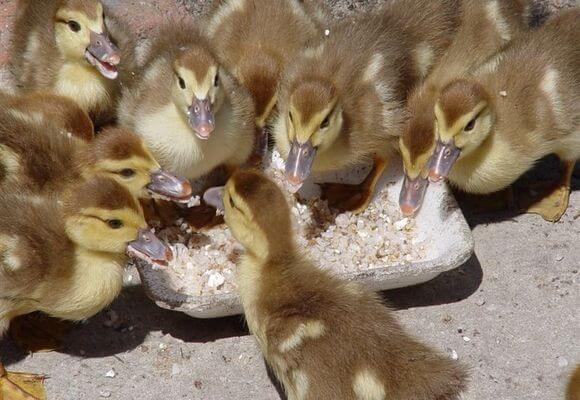

Application
The drug is administered orally and parenterally.
Internal use is the enrichment of the concentrate portion of the diet for 1–2 months. in the following dosages, ml / kg feed:
- Pregnant sows - 0.2–0.4.
- Gilts - 0.2.
- Weaning piglets - 0.3.
- Turkeys, chickens - 0.7.
- Turkey poults -1.3.
- Geese - 0.8.
- Ducks - 1.0.
Experienced poultry farmers practice fortification of day-old chickens by instilling 1 drop of Trivit on their noses.
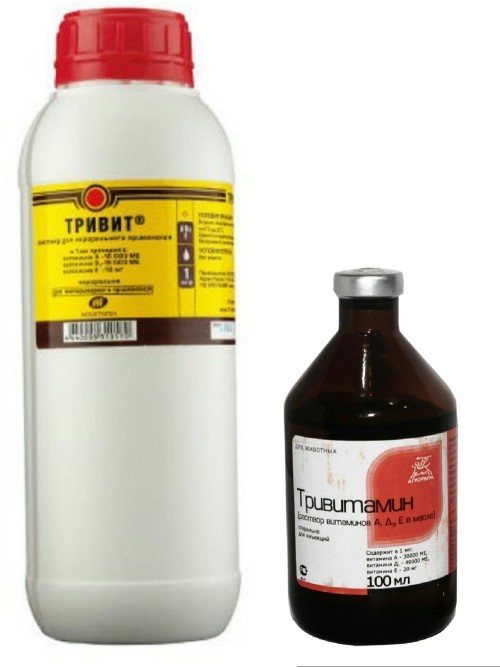

If it is decided to give Trivit personally, it is dosed dropwise per day on the head:
- Cows - 5.
- Horses - 4.
- Adult pigs - 3.
- Young horses and cattle - 3.
- Goats, sheep, dogs, cats, rabbits - 2.
- Poultry, pig, lamb - 1.
With parenteral use, the course of vitamin therapy is a month. Trivit is pierced weekly hypodermally or intramuscularly in the following doses, ml / head:
- Cows - 5.
- Young cattle - 2–4.
- For horses - 2.0-2.5.
- Foals, calves under one year old - 1.5–2.0.
- Small ruminants - 0.5-1.5.
- Pigs - 1.5-2.0.
- Dogs - 0.5-1.0.
- Rabbits, chickens - 0.2.
Drug action
Strengthening the body's defenses and raising immunity is achieved with the help of vitamin E, which is an excellent antioxidant - it not only removes viruses and harmful substances from the body, but also regenerates damaged cells.
Vitamin A is responsible for protein synthesis and improves metabolic processes, as well as controls the level of body fat - due to this, the aging process slows down.
The vitamin D component is responsible for the area of the correct formation of poultry bones: it is the control of phosphorus levels, increased absorption of calcium, bone mineralization, and improvement of the strength of the teeth.
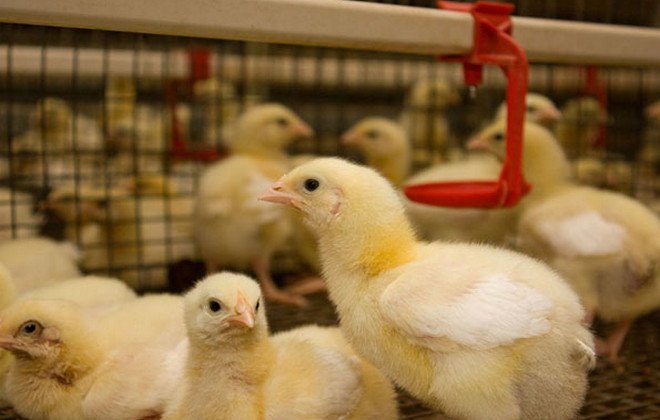

Thanks to the triunity of these vitamin components, a synergistic phenomenon is manifested - an increase in the effects of each other when taken simultaneously (due to this, poultry can recover much faster than if these vitamins were used separately).
Thus, "Trivitamin" is not only an effective drug, but also an excellent preventive measure.
Did you know? A recognized long-liver among all poultry is the goose - at home, it can live up to 35 years. In addition, the goose, along with the turkey, tops the ranking of the largest domesticated birds.
Personal prevention measures
When carrying out therapeutic and prophylactic measures using a solution of vitamins A, D3, E in oil, one should observe the general rules of personal hygiene and safety measures provided for when working with medicines.
Do not drink, smoke or eat while working with the drug. At the end of work, hands should be washed with warm water and soap. People with hypersensitivity to the components of the drug should avoid direct contact with Trivitamin.
In case of accidental contact of the drug on the skin or mucous membranes, they must be washed with running water and soap.
In case of allergic reactions or accidental ingestion of the drug into the human body, you should immediately contact a medical institution (you should have instructions for use of the drug or a label with you).
Empty vials from under the medicinal product must not be used for domestic purposes, they must be disposed of with household waste.
Testimonials
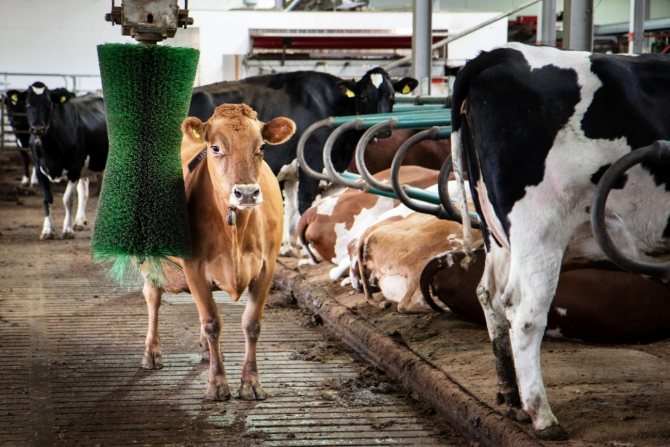

According to customer reviews, the benefits of the drug include the following:
- increased immunity;
- decrease in mortality;
- improved egg production;
- enhancement of sexual function;
- normalization of metabolism;
- resistance to infectious diseases;
- activation of growth;
fighting lameness, rickets and joint swelling. The required concentration of vitamin D in Trivitamin helps prevent congenital deformities, encephalomalacia, subcutaneous edema and muscular dystrophy.
In addition to therapy, this combined drug is recommended for use as a supportive agent in rehabilitation after an illness.
Side effects
Lack of vitamin A can impair the condition of the coat, teeth, nails, appetite and sleep. In addition, the animal's body will function less well and become susceptible to various diseases.
However, an excess of it in the body will also not lead to anything good. All possible side effects are clearly indicated in the instructions for use of "Trivitamin" for birds, animals and other individuals.
As a result of prolonged use, stool problems occur, constipation or diarrhea appears. An allergy to a certain component may appear, which manifests itself in the form of a rash, itching or irritation.
Most often, the animal begins to want to drink heavily, the daily amount of fluid consumed increases several times. The animal's condition may deteriorate sharply, it will develop a feeling of lethargy and weakness, it will sleep several times more often than usual.
If such side effects occur, then you should immediately cancel the drug. Next, you should monitor the condition of the pet for three days. It should be normalized.
Composition of active ingredients in 1 kg of premix
Vitamins:
- Vitamin A - 2,000,000 IU
- Vitamin D3 - 600,000 IU
- Vitamin E - 2,400 mg
- Vitamin K3 - 400 mg
- Vitamin B1 - 300 mg
- Vitamin B2 - 1,000 mg
- Vitamin B6 - 300 mg
- Vitamin B12 - 2.5 mg
- Niacin (PP Nicotinic Acid) 3,000 mg
- Calcium pantothenate - 1 600 mg
- Folic acid - 60 mg
- Choline - 40,000 mg
- Betaine - 10,000 mg
Antioxidant - 20,000 mg
Trace elements:
- Cobalt - 60 mg
- Copper - 1,300 mg
- Iron - 6,000 mg
- Iodine - 140 mg
- Manganese - 10,000 mg
- Zinc - 13,000 mg
- Selenium - 30 mg
Manufactured by TM Compound

